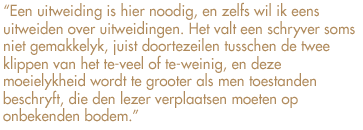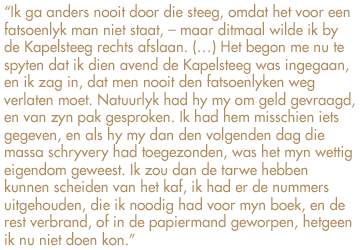


(Max Havelaar, of De Koffieveilingen der Nederlandsche Handelmaatschappij, ed. Annemarie Kets-Vree, 1998, p. 209)So says one of the narrators of Max Havelaar at the start of the fragment that you are going to read, listen to and analyse in the following pages. Who is speaking here? Droogstoppel, Stern, Sjaalman, Havelaar, or Multatuli himself? Why does the narrator think a digression is necessary? And do you, as a reader, find this digression useful, or not? These are questions to keep in mind while reading the fragment, which is a digression about digressions, and therefore very characteristic for Multatuli’s work in general and for Max Havelaar specifically.
(Multatuli, “Brief aan Krüseman”; Ik ben zwanger van denkbeelden, ed. Kets-Vree, 1995, p. 7)All of Multatuli’s writings, from his prose work to his Ideën (Ideas) and his letters, are interlaced with digressions, or ‘parentheses’, as he calls them in his by now famous letter to his old friend and publisher Arie Cornelis Krüseman. This letter, that consists of forty-four pages and was written between 24 February and 6 May 1851, can be seen as Multatuli’s early ‘manifesto’ in which the later author of Max Havelaar is already very much with us. “Don’t wait for me to continue necessarily where I left off. Life is best described in parentheses, mine is at any rate”, he writes to Krüseman. “In my story, reader, I have often left you on the high road when I was sorely tempted to take you off into the undergrowth”, says the narrator of the Havelaar-story in a very similar way. However, the reader of Max Havelaar is often taken aside “into the brushwood”, even though first narrator Droogstoppel continually tells second narrator Stern to “keep on the right path” and not loose himself to all the untruthful, trumpery verses in Sjaalman’s parcel. “Sjaalman! He left the ways of the Lord; now he is poor, and lives in a wretched garret”, warns Droogstoppel, who wants his book to be a book about coffee. And eventually, Max Havelaar turns out to be a novel about coffee, or better “on the coffee auctions of the Dutch Trading Company”, as predicted by Stern, who says: “Don’t worry, all roads lead to Rome (…) Ultimately, the business will boil down to coffee, coffee, nothing but coffee!”.
Digressions and side paths are never without a purpose in Multatuli’s work. After all, the whole Havelaar-story is written because Droogstoppel – of all characters – left the straight and narrow path by turning into an alley, the so-called ‘Kapelsteeg’, on the evening he meets Sjaalman:
(Max Havelaar, of De Koffieveilingen der Nederlandsche Handelmaatschappij, ed. AnnemarieKets-Vree, 1998, p. 78)
Click >here to continue.


